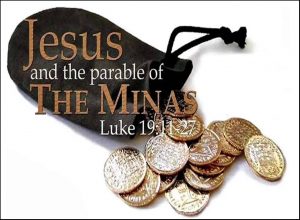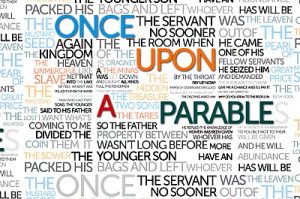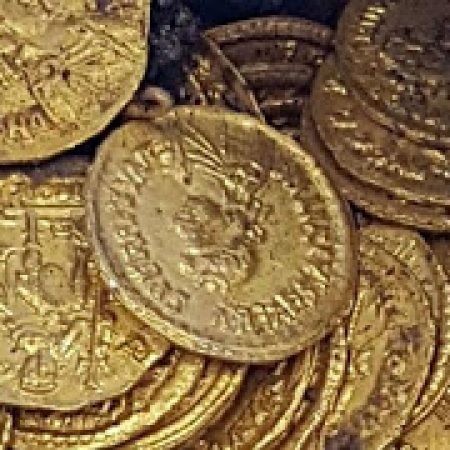 Luke 19:11-27 – We are responsible for how we administer what God entrusts to us.
Luke 19:11-27 – We are responsible for how we administer what God entrusts to us.
“As they heard these things, he proceeded to tell a parable, because he was near to Jerusalem, and because they supposed that the kingdom of God was to appear immediately. He said therefore, ‘A nobleman went into a far country to receive for himself a kingdom and then return. Calling ten of his servants, he gave them ten minas, and said to them, “Engage in business until I come.” But his citizens hated him and sent a delegation after him, saying, “We do not want this man to reign over us.” When he returned, having received the kingdom, he ordered these servants to whom he had given the money to be called to him, that he might know what they had gained by doing business. The first came before him, saying, “Lord, your mina has made ten minas more.” And he said to him, “Well done, good servant! Because you have been faithful in a very little, you shall have authority over ten cities.” And the second came, saying, “Lord, your mina has made five minas.” And he said to him, “And you are to be over five cities.” Then another came, saying, “Lord, here is your mina, which I kept laid away in a handkerchief; for I was afraid of you, because you are a severe man. You take what you did not deposit, and reap what you did not sow.” He said to him, “I will condemn you with your own words, you wicked servant! You knew that I was a severe man, taking what I did not deposit and reaping what I did not sow? Why then did you not put my money in the bank, and at my coming I might have collected it with interest?” And he said to those who stood by, “Take the mina from him, and give it to the one who has the ten minas.” And they said to him, “Lord, he has ten minas!” “I tell you that to everyone who has, more will be given, but from the one who has not, even what he has will be taken away. But as for these enemies of mine, who did not want me to reign over them, bring them here and slaughter them before me.”’”
 You will have noticed whenever you are reading any of the parables Jesus told, the author customarily uses a literary device to transfer the reader’s attention smoothly from the events swirling about Jesus to the parable itself. This is the case here. The text reads, “As they heard these things.” The words serve to segue into instruction vital to our spiritual well-being. In other words, the Spirit of God believes it important for our understanding to be aware of what was happening when Jesus told this parable. We need to take a moment to remember the events precipitating the relating of the story.
You will have noticed whenever you are reading any of the parables Jesus told, the author customarily uses a literary device to transfer the reader’s attention smoothly from the events swirling about Jesus to the parable itself. This is the case here. The text reads, “As they heard these things.” The words serve to segue into instruction vital to our spiritual well-being. In other words, the Spirit of God believes it important for our understanding to be aware of what was happening when Jesus told this parable. We need to take a moment to remember the events precipitating the relating of the story.
The first ten verses of this chapter tell the story of the conversion of Zacchaeus. He was changed from a self-centred, money-grubbing rascal to a redeemed disciple of Jesus. The salvation of this man was not accompanied without grumbling from the religious leadership of the day. They thought that people whom they loathed had no right to salvation, or even to be treated with courtesy. People often argue that those whom they detest deserve the hottest place in hell. Such sentiments are commonly expressed; however, I would say that each of us deserves the hottest place in hell. Salvation has nothing to do with who we are or even with what we have done or not done. Salvation flows from the mercy of God and is a revelation of His grace.
The evidence that Zacchaeus was changed into a new man was revealed through his view of his possessions after conversion. Listen to him after he has believed Jesus. “Behold, Lord, the half of my goods I give to the poor. And if I have defrauded anyone of anything, I restore it fourfold” [LUKE 19:8]. He wanted a clean start in life and he realised that he was responsible to administer wisely all he held; he especially realised that he could no longer continue to hold onto goods obtained through fraud or deceit.
That brings us back to the text, which begins, “as they heard these things.” The people walking with and surrounding the Master witnessed the change in this man, and since “they were near Jerusalem” and “because they supposed that the Kingdom of God was to appear immediately,” Jesus seized the moment to instruct them in a great truth.
 Jesus had identified his mission—“to seek and to save the lost” [LUKE 19:10]. The people, including, perhaps, even those who were truly disciples, took note that He was near Jerusalem. The general anticipation of the nation was that Messiah would bring political salvation. Therefore, the natural assumption was that He was about to overthrow the Roman occupation and reinstate the Davidic Kingdom. Jesus knew the error of the people’s thinking and He immediately addressed their misunderstanding of His mission. He corrected their error by relating a parable.
Jesus had identified his mission—“to seek and to save the lost” [LUKE 19:10]. The people, including, perhaps, even those who were truly disciples, took note that He was near Jerusalem. The general anticipation of the nation was that Messiah would bring political salvation. Therefore, the natural assumption was that He was about to overthrow the Roman occupation and reinstate the Davidic Kingdom. Jesus knew the error of the people’s thinking and He immediately addressed their misunderstanding of His mission. He corrected their error by relating a parable.
A FAMILIAR PARABLE — The parable Jesus told is simple enough. A nobleman was compelled to travel to a distant country in order to receive a kingdom, after which he would return. During his absence, he left an equal sum of money with each of ten servants, instructing them to engage in business until he returned. The money each servant received was one mina. A mina was weight of silver equal to about 1¼ pounds, which was the equivalent of about three months of wages during that period.
During the nobleman’s absence, the citizens instigated a rebellion in an effort to depose him. However, upon his return from receiving the kingdom bestowed upon him, he first called for his servants to give a report of their business with his moneys. The first servant had produced a one thousand percent increase. Consequently, he was rewarded by being appointed to rule over ten cities. The second had obtained a five hundred percent increase. He was rewarded with appointment to rule over five cities.
The third servant, however, had a pitiful excuse for abject failure to gain anything. “Lord, here is your mina, which I kept laid away in a handkerchief; for I was afraid of you, because you are a severe man. You take what you did not deposit, and reap what you did not sow.” Unfortunately for him, his own words condemned him. If he really believed his master was severe and if he was really afraid to him, then why didn’t he at least get interest by depositing the moneys in the bank? It would have been safe, even if it didn’t earn much. As it is, the master had actually lost money since it was not working for him. Inflation, even at a modest rate, would have reduced the value of the principle.
Jesus then says that the ruler instructed those standing nearby to take the money from this slothful servant and give it to the one who already had ten minas. Those  witnessing this action objected, indicating that they considered the actions of the ruler to be unfair. However, the nobleman justified his action by saying, “I tell you that to everyone who has, more will be given, but from the one who has not, even what he has will be taken away.” Then, Jesus has the ruler turn his attention to the rebels who attempted to depose him. His instruction concerning them was abrupt; they were to be brought before him and executed immediately. In brief, this is the parable Jesus told.
witnessing this action objected, indicating that they considered the actions of the ruler to be unfair. However, the nobleman justified his action by saying, “I tell you that to everyone who has, more will be given, but from the one who has not, even what he has will be taken away.” Then, Jesus has the ruler turn his attention to the rebels who attempted to depose him. His instruction concerning them was abrupt; they were to be brought before him and executed immediately. In brief, this is the parable Jesus told.
A SOVEREIGN, HIS SERVANTS AND THE SEDITIONISTS — In order to ensure that we fully understand this parable, keep in mind that there are three sets of individuals in the story. It should be obvious that Jesus is referring to Himself as the nobleman who is called into a far country to receive a kingdom. Of course, the kingdom that He is to receive is the Kingdom of God that all the people were expecting to be instituted immediately at that time.
We are also introduced to the nobleman’s servants. These servants can be divided into two subgroups—wise laborers and at least one slothful slakcker. We have the example of only three of the servants, which is sufficient for the purpose of the account. Two servants are commended for their astuteness in caring for the master’s wealth. One servant, however, is censured because of what must surely be recognized as his sloth.
Finally, in the parable, Jesus introduces us to certain citizens of the realm who rebel against the nobleman, the appointed ruler of the realm. These rebels are summarily dealt with after the master of the kingdom had returned.
As already stated, Jesus refers to Himself as the nobleman in the parable. Our Lord came to seek and to save the lost. The Master was always insistent that this was His mission. Repeatedly He spoke of His work of calling sinners [MATTHEW 9:13]. When the disciples were sent out during the days our Lord walked in Israel, they were instructed to go to “the lost sheep of the house of Israel” [MATTHEW 10:6].
 In this context, the parable of the lost sheep seems significant. Perhaps you recall that story Jesus told. “If a man has a hundred sheep and one of them has gone astray, does he not leave the ninety-nine on the mountains and go in search of the one that went astray? And if he finds it, truly, I say to you, he rejoices over it more than over the ninety-nine that never went astray” [MATTHEW 18:12, 13]. The heart of the Master is disposed to seek those who are lost. The lost are those who know they are sinners, those who realise that they have nothing to compel God to love them. As sinners, they must cast themselves on God’s mercy.
In this context, the parable of the lost sheep seems significant. Perhaps you recall that story Jesus told. “If a man has a hundred sheep and one of them has gone astray, does he not leave the ninety-nine on the mountains and go in search of the one that went astray? And if he finds it, truly, I say to you, he rejoices over it more than over the ninety-nine that never went astray” [MATTHEW 18:12, 13]. The heart of the Master is disposed to seek those who are lost. The lost are those who know they are sinners, those who realise that they have nothing to compel God to love them. As sinners, they must cast themselves on God’s mercy.
It seems appropriate to interject a parenthesis at this point to state clearly that the message of Christ is indeed Good News, though it is offensive to the natural man. Those who attempt to justify themselves, comforting themselves that they are not so bad, are actually in a most precarious situation. Such people fail to realise that they are sinners by the standard of a Holy God. It matters not how highly I esteem my own standards, they fail to achieve the standard of righteousness demanded by God. Therefore, if I will be righteous in the sight of God, He must confer His own righteousness on me.
And that is what is done through Christ the Lord. When I believe the message of life, believing that He died because of my sin and that He was raised for my justification, God accepts the sacrifice of Christ in my place and transfers the righteousness of Christ to me. All who believe that Jesus is the Son of God, confessing that He died because of their sin and that He rose to declare them righteous, are redeemed from sin. Christ has sought them out and saved them. Those redeemed are brought into the Kingdom of God and they receive the Name of Christ. They are forever delivered from condemnation. God will never condemn them, and they no longer need to condemn themselves.
This message is offensive to anyone who thinks that she or he can make herself or himself acceptable to God—it strips away every vestige of self-dignity. It is offensive to anyone who thinks he is better than another—it insists that each one is equally sinful in the sight of God and that each is saved in the same way. [ But the message glorifies Christ. ]
The servants of the nobleman, whether slothful or whether industrious (hence, wise), depict those individuals who are members of the Kingdom of God. These servants are followers of the Lord Jesus Christ. His servants are those individuals who accept that they are sinners, but who have trusted that Jesus died because of their sin and that He has risen to life to declare them free of condemnation. Anyone who has been born from above is one of the servants of Christ, though being saved does not automatically imply that the redeemed individual is either productive or wise.
 Servants of the King may be slothful, but the call of Christ is a call to diligent service; there is no permission to be lazy in the work of the Kingdom. Jeremiah condemned the laziness of those who wished to be counted as allied with God. “Cursed is he who does the work of the Lord with slackness” [JEREMIAH 48:10]. Strong words! Strong words, indeed. Clearly, God is not overly impressed with His servants who are at ease in Zion. Amos pronounces woe on such individuals [AMOS 6:1]. Surely, this cautionary charge applies to us who are called by the Name of the Son of God.
Servants of the King may be slothful, but the call of Christ is a call to diligent service; there is no permission to be lazy in the work of the Kingdom. Jeremiah condemned the laziness of those who wished to be counted as allied with God. “Cursed is he who does the work of the Lord with slackness” [JEREMIAH 48:10]. Strong words! Strong words, indeed. Clearly, God is not overly impressed with His servants who are at ease in Zion. Amos pronounces woe on such individuals [AMOS 6:1]. Surely, this cautionary charge applies to us who are called by the Name of the Son of God.
Rebels of the Kingdom obviously refers to the inhabitants of this fallen world—earth dwellers. These individuals have refused to receive the reign of Christ over their lives. Perhaps the renegade is openly rebellious to the reign of Christ, declaring himself or herself to be an atheist or an agnostic. However, such rebels may be less open about their unbelief, saying that they actually believe Jesus, though never having been born again they live as though He were a myth. Again, it is possible that the rebels are religious, involved in pious activities, punctilious about religious observances and scrupulous in performing their religious duties, but these individuals are lost since they have never been born into the Kingdom of God. They assume that their religious efforts will somehow coerce God into accepting them. It is actually immaterial whether sinners are religious or whether they are openly rebellious, if they have never been born again they are lost and thus they are in rebellion against the reign of Heaven.
 John’s Gospel reveals the rebel mindset in these verses found in an early chapter. “Whoever believes in him is not condemned, but whoever does not believe is condemned already, because he has not believed in the name of the only Son of God. And this is the judgment: the light has come into the world, and people loved the darkness rather than the light because their deeds were evil. For everyone who does wicked things hates the light and does not come to the light, lest his deeds should be exposed. But whoever does what is true comes to the light, so that it may be clearly seen that his deeds have been carried out in God” [JOHN 3:18-21]. These verses are disturbing because they expose the deliberate nature of the rebel mind. The unsaved are not lost because they cannot receive the grace of God—they are lost because they will not receive the mercies of the Lord Christ. The unsaved stand condemned because they refuse to live in the light. It is as though they defiantly embrace their chains and rejoice in their slavery. All the while proclaiming their freedom, they continue blind and unaware under sentence of death.
John’s Gospel reveals the rebel mindset in these verses found in an early chapter. “Whoever believes in him is not condemned, but whoever does not believe is condemned already, because he has not believed in the name of the only Son of God. And this is the judgment: the light has come into the world, and people loved the darkness rather than the light because their deeds were evil. For everyone who does wicked things hates the light and does not come to the light, lest his deeds should be exposed. But whoever does what is true comes to the light, so that it may be clearly seen that his deeds have been carried out in God” [JOHN 3:18-21]. These verses are disturbing because they expose the deliberate nature of the rebel mind. The unsaved are not lost because they cannot receive the grace of God—they are lost because they will not receive the mercies of the Lord Christ. The unsaved stand condemned because they refuse to live in the light. It is as though they defiantly embrace their chains and rejoice in their slavery. All the while proclaiming their freedom, they continue blind and unaware under sentence of death.
The sovereign in the parable, the nobleman, is Jesus, the Son of God. He has returned to Heaven in order to receive the Kingdom from the Father. The servants of the nobleman are the redeemed of Christ the Lord; these are the Christians, those who are redeemed by His grace and who have been made alive in Him. They have been left on the earth in order to honor Him through serving His cause and through promoting His reign over others. The seditionists are the lost that refuse to submit to the reign of Christ.
You and I are either servants or seditionists. Either we are mounting an insurrection against the rule of Heaven or we are working to advance the cause of Christ the Lord. In this life, we cannot be neutral. Either we have been born into the Kingdom of God by faith in Christ Jesus the Lord, or we are not born again. Either we are saved, or we are lost. There is no alternative other than these.
APPLICATIONS OF THE PARABLE — What should we learn from the parable? I suppose that there are multiple lessons one could properly tease from this parable, but I will focus on but a few applications of immediate value to us as followers of Christ, and on one application which must serve as a warning to all who are outside the Kingdom of God.
 We are afforded a rough outline of future events in this parable. This parable is pertinent to us as Christians living in this day between Christ’s ascension and His return. We now live in the period between VERSES FOURTEEN and FIFTEEN. The nobleman has gone to a far country to receive the Kingdom, but He will return at a time unknown to us. I must state this truth as clearly as possible. Jesus has gone to Heaven to receive the Kingdom from the Father, but He is returning momentarily at a time unknown to us.
We are afforded a rough outline of future events in this parable. This parable is pertinent to us as Christians living in this day between Christ’s ascension and His return. We now live in the period between VERSES FOURTEEN and FIFTEEN. The nobleman has gone to a far country to receive the Kingdom, but He will return at a time unknown to us. I must state this truth as clearly as possible. Jesus has gone to Heaven to receive the Kingdom from the Father, but He is returning momentarily at a time unknown to us.
It was not unusual for rulers to travel to Rome at that time in order to receive the Kingdom over which they were to rule. In fact, the parable would have had special significance for those listening on that day. Herod the Great had received the right to rule over his own kingdom in this manner. A Roman vassal, Herod Antipas received his kingdom by journeying to Rome to receive permission to rule. Upon his death, his will stipulated that his kingdom was to be divided between his three sons, all of whom eventually journeyed to Rome to press their claims.
Archelaus, the son of Herod the Great, had been given the realm of Judea. However, the people detested him and they sent representatives to ask that he not be given the kingdom. He had certainly given them good reason to hate him. At the first Passover following his accession, for example, he had slaughtered 3,000 of his subjects. Despite the petition of the citizens of Judea, the emperor confirmed Archelaus in the place of authority, although he did deny him the title of king.
Those listening to the parable Jesus told would have known these things. At first, I have no doubt that they were somewhat perplexed. However, we have the advantage of time and the advantage of the presence of His Spirit to assist us in understanding the meaning of the parable. Keep in mind the reason that Jesus told the parable.
It was the Passover season, an emotionally charged time for the Jews. We have already noted that the people were eager to see Jesus, because they anticipated the immediate proclamation of the Kingdom of God [VERSE ELEVEN]. They detested Roman rule. They were tired of vassal tyrants. They wanted a Kingdom of their own. Disciples of Jesus were no less eager for Him to proclaim the Kingdom. We can only imagine that as they travelled the twenty-seven kilometres from Jericho to Jerusalem, trudging along the dusty roads, anticipation of what would transpire upon arrival in the Holy City grew. The nearer to Jerusalem, the greater the anticipation. Remember, the disciples were not fully aware of the pending crucifixion despite the repeated statements of the Master. They even argued shortly after Jesus related this parable about their own positions in the Kingdom [see LUKE 22:24].
 For three and one-half years, Jesus had moved throughout the countryside. Now, according to His own words, He was going to Jerusalem. The tension was palpable. Surely, the people thought, this strange man will now establish the Kingdom of David. The word translated by our English phrase “was to appear” in the ELEVENTH VERSE is a strong word. The people wanted the Kingdom of God to appear, and they expected that Jesus would proclaim Himself king. They were expecting the throne of David to be restored with the overthrow of Roman rule. They longed for the Messianic reign, but their expectation was not what is promised in the Word of God. Though ready to rally to His banner if He would fight, they were quite unwilling to accept His reign over their hearts if it meant confessing their need of a Savior because of their sinful nature.
For three and one-half years, Jesus had moved throughout the countryside. Now, according to His own words, He was going to Jerusalem. The tension was palpable. Surely, the people thought, this strange man will now establish the Kingdom of David. The word translated by our English phrase “was to appear” in the ELEVENTH VERSE is a strong word. The people wanted the Kingdom of God to appear, and they expected that Jesus would proclaim Himself king. They were expecting the throne of David to be restored with the overthrow of Roman rule. They longed for the Messianic reign, but their expectation was not what is promised in the Word of God. Though ready to rally to His banner if He would fight, they were quite unwilling to accept His reign over their hearts if it meant confessing their need of a Savior because of their sinful nature.
The parable Jesus told addressed their expectation and it also serves to explain that the Kingdom was not to be established at that time; the expectations of the masses were not to be fulfilled. The Lord Jesus would be gone for a period, but His servants were responsible to be busy during the interim. Upon His return, at a time when people least expect Him, the Master will first reward His servants and then judge the earth.
Consider the time line established by Scripture. We now live in what is commonly referred to as the Age of Grace, also known as the Church Age. This is the era in which God works by His Holy Spirit through His people. Christ is not physically present, but the Church is His Body on earth. When a church is full of Spirit-led Christians, submitted to Christ the Lord and serving one another in love, the world witnesses the character of Christ displayed in the ministries of that collective Body. Though no one of us will ever be perfectly Christ-like, submitted to His reign we can be a church that demonstrates the glory of Christ among us.
 There is pending a day when Christ shall call out all His redeemed people. The dead in Christ will rise first and then we who are alive will be caught up together with them in the air to meet the Lord Christ. This event, spoken of as the Rapture of the Church by theologians, is when Christ our Lord will reward His servants, exhibiting the perfection of His glorious work in the lives of those who are redeemed.
There is pending a day when Christ shall call out all His redeemed people. The dead in Christ will rise first and then we who are alive will be caught up together with them in the air to meet the Lord Christ. This event, spoken of as the Rapture of the Church by theologians, is when Christ our Lord will reward His servants, exhibiting the perfection of His glorious work in the lives of those who are redeemed.
The Rapture of the Church ushers in the day when Christ rewards His servants and it also serves to initiate the period of divine judgments on all the earth, a time known as the Great Tribulation. With trip hammer blows, God will rain down multiple judgments on this unbelieving world for seven years. At the conclusion of that time of judgment, Christ will return to reign over this world for a period of one thousand years. This time of the reign of Christ is known as the Millennium. All this is briefly pictured through the parable Jesus told as He passed through Jericho.
The parable stresses the equality of opportunity for each Christian. Some people confuse this parable with another parable Jesus told known as the parable of the talents. Though there are some similarities, there are significant differences to be noted. This is not the parable of the talents [see MATTHEW 25:14-30]. In the parable of the talents, the master of the servants divides up his wealth among three servants. Each servant receives a different amount based upon his abilities. In this parable of the minas, ten servants all receive identical amounts and a charge to engage in business with the nobleman’s wealth.
The parable of the talents points to the variety of gifts that God entrusts to His servants, but in this parable of the minas, each servant receives the same amount. Therefore, what is in view is equality of opportunity for each of us as servants of Christ. Each servant of the Lord has precisely the same opportunity to advance His cause.
 Each Christian has the identical opportunity to serve Christ and to extend His Kingdom. It is fair to say that each of us is a Christian either extending His Kingdom, employing the grace and gifts He has entrusted to us, or we are burying those gifts in the hope that we will not really need to give an account of what we have accomplished. What should be clear is that Christ expects us to be faithful workers in His Kingdom. This is evident in the Great Commission. Jesus said, “Go therefore and make disciples of all nations, baptizing them in the name of the Father and of the Son and of the Holy Spirit, teaching them to observe all that I have commanded you” [MATTHEW 28:19, 20].
Each Christian has the identical opportunity to serve Christ and to extend His Kingdom. It is fair to say that each of us is a Christian either extending His Kingdom, employing the grace and gifts He has entrusted to us, or we are burying those gifts in the hope that we will not really need to give an account of what we have accomplished. What should be clear is that Christ expects us to be faithful workers in His Kingdom. This is evident in the Great Commission. Jesus said, “Go therefore and make disciples of all nations, baptizing them in the name of the Father and of the Son and of the Holy Spirit, teaching them to observe all that I have commanded you” [MATTHEW 28:19, 20].
Though you may not stand before a congregation week-by-week, you work with people who need to hear the Gospel; you have a family that is lost and under sentence of death; you have friends who are lost. You are responsible as a servant of Christ Jesus to tell others of His love and of His salvation. You have the same opportunity as any other Christian to do the work Christ has assigned each of His servants.
Here is a principle that is poorly understood by Christians. God calls you to be faithful; He does not call you to be successful. Did you hear that? God calls you to be faithful; He does not call you to be successful. Since each of us who is a Christian is called to faithful service, should we fail to seize the opportunity to serve, we are disobedient. This is the basis for Peter’s encouragement to always be “prepared to give a defense to anyone who ask you for a reason for the hope that is in you” [1 PETER 3:15].
Playing it safe is disobedience to Christ. The master called the slave that hid the mina a “wicked servant.” According to the parable, this slave reasoned that if he tried to carry on business with the money and lost it, the repercussion from his master would be fearful. Not fully trusting the intent of the master, the slave thought he had played it safe. He placed the money in a handkerchief and he buried it. Really, this was a rather careless treatment of the master’s mina. He should have at least lent it to the moneylenders where it would have earned some interest.
From the nobleman’s point of view, the slave was wicked. He was not only careless, but he was disobedient. Did you notice that? Carefully read VERSE THIRTEEN. “Calling ten of his servants, [the nobleman] gave them ten minas, and said to them, ‘Engage in business until I come.’” Each slave was responsible to use the master’s money to promote the master’s business interests. This wicked slave failed to follow his master’s command. Consequently, he was disobedient and therefore he was called wicked. Playing it safe is wicked! The slave considered himself honest because he returned the mina. The master labeled the slave wicked because he returned the mina with no gain.
Many Christians “play it safe” in the use of the Master’s grace entrusted to them. The result of risk is potential failure or ridicule. Obedience is risky. Certainly, we dare not expect that inhabitants of this dying world will rejoice in our obedience, regardless of how compassionate or honorable we are in their presence. However, if we refuse to use what God has entrusted to us, do we really play it safe? Or are we disobedient? The Bible knows nothing of “playing it safe” in the service of God and in discipleship.
If you are a Christian, it is not enough to simply attend a worship service when you feel like it. You are responsible for the gift of life you have received. The Proverbs has a pithy saying that strikes at the heart of self-preservation and at the heart of spiritual lethargy. Turn in your Bible to PROVERBS 24:11, 12 and consider how it applies to us.
“Rescue those who are being taken away to death; hold back those who are stumbling to the slaughter. If you say, “Behold, we did not know this,” does not he who weighs the heart perceive it Does not he who keeps watch over your soul know it, and will he not repay man according to his work?”
I urge each of you who is a Christian, each one who confesses Christ as Lord, to realize that you are responsible not only to make every effort to be godly, but you are also responsible to tell others about your faith. To fail to do this is to be disobedient and to merit the label of a wicked servant.
VERSES TWENTY-FOUR and TWENTY-FIVE disturbs some people, but they should not. The master commands those standing nearby to take the mina from the idle servant and give it to the one who has ten. When the attendants and other servants protest, the master states a principle of the Faith, “I tell you that to everyone who has, more will be given, but from the one who has not, even what he has will be taken away.” In the Kingdom of God, whether an individual has much or little depends on his use of opportunities to increase what he already has. This is a greatly neglected principle of the Faith.
If you are a student of the Word, you will gain even greater understanding as you study the Word. If you teach others what you know, your knowledge will increase. If you are a soul-winner, you will become even more proficient at winning souls. The harder you work at the cause of Christ, the more capable you will become in your labors. The same is true in life, but it holds especially true in the work of the Kingdom.
 God is just, and in justice, His faithful servants will be rewarded. Faithful, obedient servants are rewarded by the master. The reward is a surprise, however. Those who work diligently are rewarded with more work! “If a man plays a game and goes on practicing at it, he will play it with ever greater efficiency; if he does not practice, he will lose much of whatever knack and ability he has. If we discipline and train our bodies, they will grow ever fitter and stronger; if we do not, they will grow flabby and lose much of the strength we have. If a schoolboy learns Latin, and goes on with his learning, the wealth of Latin literature will open wider and wider to him; if he does not go on learning, he will forget much of the Latin he knows. If we really strive after goodness and master this and that temptation, new vistas and new heights of goodness will open to us; if we give up the battle and take the easy way, much of the resistance power we once possessed will be lost and we will slip from whatever height we had attained.
God is just, and in justice, His faithful servants will be rewarded. Faithful, obedient servants are rewarded by the master. The reward is a surprise, however. Those who work diligently are rewarded with more work! “If a man plays a game and goes on practicing at it, he will play it with ever greater efficiency; if he does not practice, he will lose much of whatever knack and ability he has. If we discipline and train our bodies, they will grow ever fitter and stronger; if we do not, they will grow flabby and lose much of the strength we have. If a schoolboy learns Latin, and goes on with his learning, the wealth of Latin literature will open wider and wider to him; if he does not go on learning, he will forget much of the Latin he knows. If we really strive after goodness and master this and that temptation, new vistas and new heights of goodness will open to us; if we give up the battle and take the easy way, much of the resistance power we once possessed will be lost and we will slip from whatever height we had attained.
“There is no such thing as standing still in the Christian life. We either get more or lose what we have. We either advance to greater heights or slip back.” [3] We know this to be true and we accept it in every other area of life. If you want a job done, you ask a busy person. They are the people who make things happen. Seldom does an indolent person accept a task, and they are never sufficiently dependable to complete a job without constant prodding. Christians are not to be lethargic or lazy. Christians are called to be an industrious people, especially in the work of the Kingdom.
God is just, and in justice, the rebel will be destroyed. In the parable, those citizens who rejected the rule of the nobleman and who sent their deputation to oppose his installation as king are not forgotten. Installed in his kingdom and with accounts of his trading servants finalized, the nobleman commands the destruction of those he calls plainly “these enemies of mine” [VERSE TWENTY-SEVEN]. They set themselves in opposition to him and they must now face the consequences.
Perhaps you find this conclusion particularly severe and you recoil at the fierceness of Jesus’ conclusion; but beneath this grim imagery is the equally grim fact that the coming of Jesus to this world puts every man to the test. Every individual is compelled to a decision by the presence of Christ the Lord. That decision is no light matter. It is a matter of life and death.
All who oppose Jesus, whether through open rebellion or through tacit rebellion, whether through open rejection of His rule over their life, or whether through quiet failure to receive Him as Lord, are under eternal condemnation. They are lost, and the sentence for their refusal to own Him as King will at last be pronounced and they shall be eternally banished from the Kingdom.
That is a dark picture that John paints in the Apocalypse. “I saw a great white throne and him who was seated on it. From his presence earth and sky fled away, and no place was found for them. And I saw the dead, great and small, standing before the throne, and books were opened. Then another book was opened, which is the book of life. And the dead were judged by what was written in the books, according to what they had done. And the sea gave up the dead who were in it, Death and Hades gave up the dead who were in them, and they were judged, each one of them, according to what they had done. Then Death and Hades were thrown into the lake of fire. This is the second death, the lake of fire. And if anyone’s name was not found written in the book of life, he was thrown into the lake of fire” [REVELATION 20:11-15].
 I would not wish that any person listening to this message would experience this fate. Peter writes that “The Lord is not slow to fulfill his promise as some count slowness, but is patient toward you, not wishing that any should perish, but that all should reach repentance. But the day of the Lord will come like a thief, and then the heavens will pass away with a roar, and the heavenly bodies will be burned up and dissolved, and the earth and the works that are done on it will be exposed” [2 PETER 3:9, 10].
I would not wish that any person listening to this message would experience this fate. Peter writes that “The Lord is not slow to fulfill his promise as some count slowness, but is patient toward you, not wishing that any should perish, but that all should reach repentance. But the day of the Lord will come like a thief, and then the heavens will pass away with a roar, and the heavenly bodies will be burned up and dissolved, and the earth and the works that are done on it will be exposed” [2 PETER 3:9, 10].
This is our call to anyone who is now a rebel to grace. Whether you have to this point openly refused to become a Christian, or whether you have simply drifted with the flow, consider the message of life that we proclaim and seize the freedom and the pardon now offered. The Word declares, “If you confess with your mouth that Jesus is Lord and believe in your heart that God raised him from the dead, you will be saved. For with the heart one believes and is justified, and with the mouth one confesses and is saved. For the Scripture says, “Everyone who believes in him will not be put to shame.” For there is no distinction between Jew and Greek; the same Lord is Lord of all, bestowing his riches on all who call on him. For ‘everyone who calls on the name of the Lord will be saved’” [ROMANS 10:9-13].
This is the day of salvation. This is the day of grace. Come, confessing Christ as Master of your life. Come, receiving mercy and grace from Him. Come to openly identify as His servant. Come to enter His Kingdom and to be at peace. Amen.

0 Comments